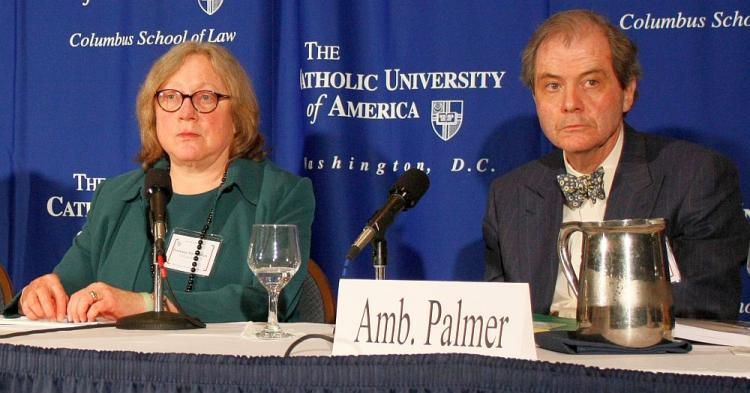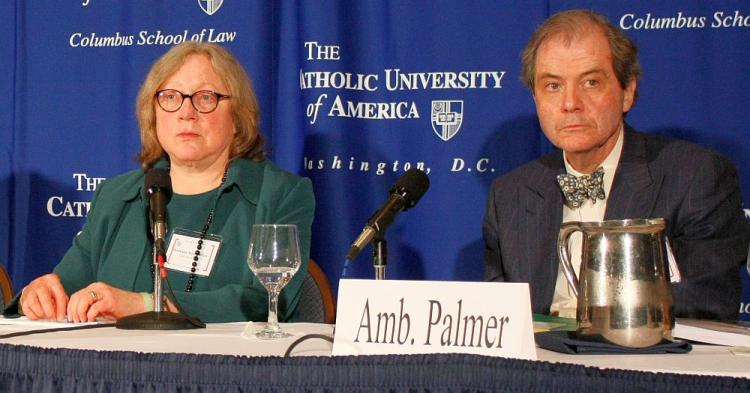Civil society—that is, a society of the people—cannot thrive in a country where a one-party state attempts to control everything. But civil society institutions are pretty helpful for solving social problems. China has a lot of social problems. So why can’t the Chinese Communist Party (CCP) solve that dilemma by simply creating a civil society—from scratch, as it were?
The topic as a whole, including the self-contradiction involved in the CCP’s new effort, was taken up by experts at a panel organized by the Catholic University of America’s Columbus School of Law, held at the National Press Club on Feb. 8.
Dr. Anna Brettell, who works for the Congressional-Executive Commission on China, attempted to explain the challenges independent organizations face in China. These challenges are mostly traceable back to the CCP.
Barriers to the formation of civil groups are numerous: a restrictive political environment, a disabling legal environment, challenges to institutional capacity (that is a lack of know-how, essentially caused by the previous two lacks), a lack of resources, and a Kafkaesque Castle of communist bureaucracy on nonprofit registration that makes it all very difficult.
But some things have changed, or at least in China, are said to have changed.
The idea of civil society is to have people organize themselves spontaneously, from the bottom up, to deal with the problems in their daily lives.
Since early 2000 Party officials caught on to the fact that civil society organizations, in some ways, might actually help them. So they decided it was time to create civil society. Reforms were debated, pilot projects were flown, and central authorities worked with 13 provinces and cities on “experiments.”
Some of these experiments may sound unusual to the Western ear. They include, for example, “strengthening Party organizations” within NGOs. That is, boosting the CCP’s role. Of course, it is a contradiction in terms: A civil society is independent of the government, an organic set of institutions that is fermented in the freedom of the populace. But the Party wants to control whatever it can, so the two are fundamentally at odds; the idea of a Party organization within a NGO is the very opposite of civil society. But, in the end, the CCP feels the first step toward creating independent social organizations is to increase its control over them.
Other ideas included encouraging rural organizations to develop community-based groups in their areas. This is done in a typical top-down manner. In Qingdao, the city Party Committee said there must be 10 community organizations, of which two must have the capacity to deliver on government contracts for social welfare. Using contracts instead of grants for funding enhances political control.
The apparatchiks have also been tasked with “increasing volunteerism at the local level.” Residence committees and street offices are to start up community-based organizations. They’re graded. If the level of “volunteerism” isn’t high enough, job evaluations are besmirched. Residence committees are the smiling, neighborly face of oppression left over from the Maoist days. Now, the Party’s block monitors are going to increase volunteerism? One imagines how the “volunteers” will feel.
Theoretically, there is no need for NGOs in a socialist paradise; practically, investing in and enshrining as independent people-powered organizations in many cases runs counter to the Party’s interests (as when, for example, one too aggressively exposes systemic abuses against minority groups—that’s not helpful for the official image).
After the discussion, the question of recent history raised its head.
I asked a question about civil society organizations during the Republican and Nationalist periods. That is an important period. It is the only example of a pre-communist modern, or modernizing China, lasting in the brief period from the fall of the Qing Dynasty (1911) to the coming of the communist Armageddon (1949). What lessons can the New China draw from that experience?
Here the host of the panel, professor Karla W. Simon of the Catholic University, was in her element, because her research focuses on the Nationalist period (a subset of the 1911 to 1949 period). During that time, there was a thriving public sphere. When Shanghai was under siege from the Japanese (1937), “people just voluntarily rose up and set up societies to save the people who needed health care,” and many other things like that.
And the lessons? Dr. Lester Salamon, director of John Hopkins Center for the Civil Society Studies, drew a historical parallel. “The same thing occurred in Central and Eastern Europe: rescuing the past was an important part to building a contemporary civil society sector in that part of the world. I know of cases where the children of leaders … of earlier interwar-period civil society organizations re-established the same organizations that their mothers or fathers had run in an earlier period. So the message was carried generationally.”
This is relevant to the China question. Obviously, Communist Party demise will presage any revival of genuine civil society in China. And Party officials must think so themselves: In the first week of January the Central Propaganda Department issued a directive to Chinese media, ordering that they were no longer to use the term “civil society” in news reports.
The topic as a whole, including the self-contradiction involved in the CCP’s new effort, was taken up by experts at a panel organized by the Catholic University of America’s Columbus School of Law, held at the National Press Club on Feb. 8.
Dr. Anna Brettell, who works for the Congressional-Executive Commission on China, attempted to explain the challenges independent organizations face in China. These challenges are mostly traceable back to the CCP.
Barriers to the formation of civil groups are numerous: a restrictive political environment, a disabling legal environment, challenges to institutional capacity (that is a lack of know-how, essentially caused by the previous two lacks), a lack of resources, and a Kafkaesque Castle of communist bureaucracy on nonprofit registration that makes it all very difficult.
But some things have changed, or at least in China, are said to have changed.
The idea of civil society is to have people organize themselves spontaneously, from the bottom up, to deal with the problems in their daily lives.
Since early 2000 Party officials caught on to the fact that civil society organizations, in some ways, might actually help them. So they decided it was time to create civil society. Reforms were debated, pilot projects were flown, and central authorities worked with 13 provinces and cities on “experiments.”
Some of these experiments may sound unusual to the Western ear. They include, for example, “strengthening Party organizations” within NGOs. That is, boosting the CCP’s role. Of course, it is a contradiction in terms: A civil society is independent of the government, an organic set of institutions that is fermented in the freedom of the populace. But the Party wants to control whatever it can, so the two are fundamentally at odds; the idea of a Party organization within a NGO is the very opposite of civil society. But, in the end, the CCP feels the first step toward creating independent social organizations is to increase its control over them.
Other ideas included encouraging rural organizations to develop community-based groups in their areas. This is done in a typical top-down manner. In Qingdao, the city Party Committee said there must be 10 community organizations, of which two must have the capacity to deliver on government contracts for social welfare. Using contracts instead of grants for funding enhances political control.
The apparatchiks have also been tasked with “increasing volunteerism at the local level.” Residence committees and street offices are to start up community-based organizations. They’re graded. If the level of “volunteerism” isn’t high enough, job evaluations are besmirched. Residence committees are the smiling, neighborly face of oppression left over from the Maoist days. Now, the Party’s block monitors are going to increase volunteerism? One imagines how the “volunteers” will feel.
Theoretically, there is no need for NGOs in a socialist paradise; practically, investing in and enshrining as independent people-powered organizations in many cases runs counter to the Party’s interests (as when, for example, one too aggressively exposes systemic abuses against minority groups—that’s not helpful for the official image).
After the discussion, the question of recent history raised its head.
I asked a question about civil society organizations during the Republican and Nationalist periods. That is an important period. It is the only example of a pre-communist modern, or modernizing China, lasting in the brief period from the fall of the Qing Dynasty (1911) to the coming of the communist Armageddon (1949). What lessons can the New China draw from that experience?
Here the host of the panel, professor Karla W. Simon of the Catholic University, was in her element, because her research focuses on the Nationalist period (a subset of the 1911 to 1949 period). During that time, there was a thriving public sphere. When Shanghai was under siege from the Japanese (1937), “people just voluntarily rose up and set up societies to save the people who needed health care,” and many other things like that.
And the lessons? Dr. Lester Salamon, director of John Hopkins Center for the Civil Society Studies, drew a historical parallel. “The same thing occurred in Central and Eastern Europe: rescuing the past was an important part to building a contemporary civil society sector in that part of the world. I know of cases where the children of leaders … of earlier interwar-period civil society organizations re-established the same organizations that their mothers or fathers had run in an earlier period. So the message was carried generationally.”
This is relevant to the China question. Obviously, Communist Party demise will presage any revival of genuine civil society in China. And Party officials must think so themselves: In the first week of January the Central Propaganda Department issued a directive to Chinese media, ordering that they were no longer to use the term “civil society” in news reports.






